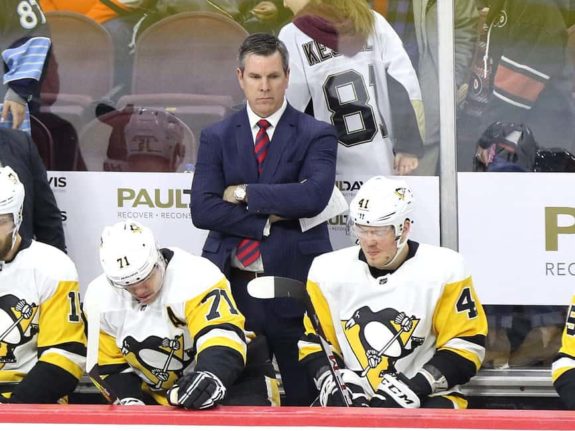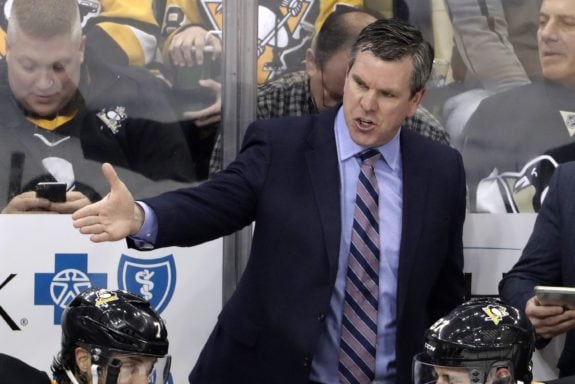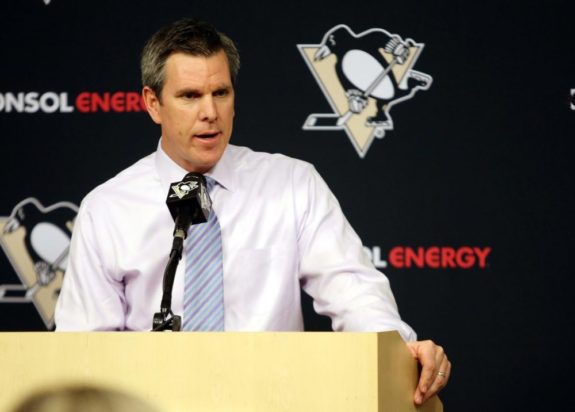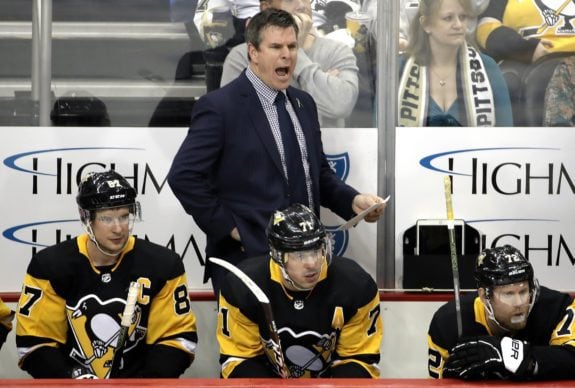The Pittsburgh Penguins last four seasons have been nothing short of exciting: four playoff runs, two Stanley Cup championships, two victory parades, and 189 wins, 174 of which came under the direction of head coach Mike Sullivan.
On July 5, the organization signed Sullivan to a four-year contract extension that runs through the 2023-24 season in hopes of keeping the team among the elite in the NHL, where they firmly established themselves after his takeover in December 2015.
Though it’s easy for a team to be successful with names like Sidney Crosby and Evgeni Malkin on the roster, even the best players can suffer under the direction of an inexperienced coach, something that hasn’t been a problem for the Penguins under Sullivan.
Sullivan Made History in First Two Seasons
As a franchise, the Penguins have, in general, always benefited from big changes or shake-ups, like winning draft lotteries, mourning the loss of a beloved coach, or changing up the team leadership midseason.
Though Sullivan was not the first Penguins’ head coach to win the Stanley Cup after assuming the position midway through the year – that was Dan Bylsma, who led Pittsburgh to victory in 2009 – he is one of only seven coaches to be able to claim that honor. The first coach to win the Stanley Cup after joining a team midseason was Dick Irvin of the Toronto Maple Leafs in 1932, and the most recent is Craig Berube, whose St. Louis Blues took home the trophy this postseason.

As difficult as it is to win the Stanley Cup just once in a career, Sullivan and the Penguins made winning back-to-back championships in 2016 and 2017 look easy. It was the first time this feat had been accomplished since former Pittsburgh coach Scotty Bowman led the Detroit Red Wings to two Cups in 1996 and 1997, 20 years earlier.
With the 2017 victory, Sullivan became just the second head coach in NHL history to win Stanley Cups in each of his first two seasons behind the bench for one team. The other was Toe Blake, who helped the Montreal Canadiens capture the same success in 1957 and 1958.
Sullivan Stands Out Among American-Born Coaches
Is it a coincidence that U.S.-born Sullivan signed his contract extension on July 5, the day after American Independence Day? Probably. However, coincidence or not, he has proven over the last four seasons that he’s one of the top American coaches in the NHL.
With the 2016 Stanley Cup victory, Sullivan became just the sixth American-born head coach to win the trophy, joining former Penguins coaches Bob Johnson and Bylsma in that category.

When Pittsburgh and the Nashville Predators met in the Stanley Cup Final in 2017, it marked the first time in NHL history that two American-born coaches – Sullivan and Peter Laviolette – squared off for hockey’s biggest prize.
American coaches, themselves, try not to base their accomplishments on nationality. Before the Penguins and Predators series, American-born coach John Tortorella told Sam Werner of the Pittsburgh Post-Gazette:
“It’s not a Canadian or American thing. I never look at it that way. I’m proud of some of the products that we have come out of USA Hockey. These two guys [Sullivan and Laviolette] have grinded away… It’s not an American-Canadian thing, but as a U.S. citizen and a coach within the USA ranks, I’m thrilled that we’re seeing a couple all-stars here go at it,”
(from ‘Mike Sullivan, Peter Laviolette make Stanley Cup final history,’ Pittsburgh Post-Gazette – 5/27/17).
Though nationality is less important to those within the ranks, with a Penguins victory that year, Sullivan became the first American head coach to win multiple Stanley Cups, which is a great accomplishment.
Sullivan’s Reach Extends Beyond the Postseason
Though Sullivan was able to capture the most coveted trophy in hockey twice in his first two seasons coaching the Penguins, and is the only coach in team history to win multiple Stanley Cups with the club, he’s good for more than just marching a team through the playoffs, which is necessary for franchises that want to return there again and again.
Sullivan has coached 300 regular-season games for the Penguins over the past four seasons, and has accumulated 174 wins, the third-most in franchise history. He has the second-best all-time win percentage of Penguins head coaches with .647, coming in second to Bylsma. Out of 22 Penguins coaches, only four of them have reached or exceeded 100 wins in their career with the club, and only three have recorded 50 wins in a single season. Sullivan belongs to both of those categories.

Since Sullivan took over the team, Pittsburgh has recorded 100 or more points every season; they have scored 994 goals, which is tied for the most in the NHL with the Tampa Bay Lightning; their 174 wins are the third-highest in the NHL; and they have won 38 playoff games, more than any other team in the league.
While every season can’t be a Stanley Cup winner, with stats like those, it’s a safe bet to say Penguins management is hopeful that the franchise under Sullivan will continue along the same path in the future. If he completes all four seasons of his contract, Sullivan will be the longest-tenured coach in franchise history, coaching a portion of eight seasons with the club. The current longest-tenured coach is Eddie Johnston, who coached 516 games over seven seasons.
Can Sullivan Stay Fresh for Four More Seasons?
Since the Penguins are a team whose success normally comes on the heels of big changes, the more superstitious fans and analysts might question the team’s ability to stay motivated for four more seasons under Sullivan.

One could argue that moving Phil Kessel this offseason, and the rumors of another trade on the way, are enough to keep things interesting in the locker room for the 2019-20 season, but should people be worrying about the Penguins becoming complacent in the future?
RELATED: Penguins Get a Cheaper Kessel in Galchenyuk
If you ask Sullivan, he’s not concerned with things becoming mundane. In an interview with the Penguins’ media team’s Sam Kasan, he said:
“I’ll continue to try to evolve myself as a coach and I’ll challenge my staff as well to evolve as a staff in more ways than one … to build relationships with our players that [are] critically important to working together to accomplish a common goal.”
Sullivan does have a history of being unafraid to change things up, including switching up lines and even goaltenders to maximize success, keeping other teams guessing, and keeping his own players from getting too comfortable. With his track record, four more years of Sullivan could be exactly what the Penguins need to hang a few more championship banners in the rafters.